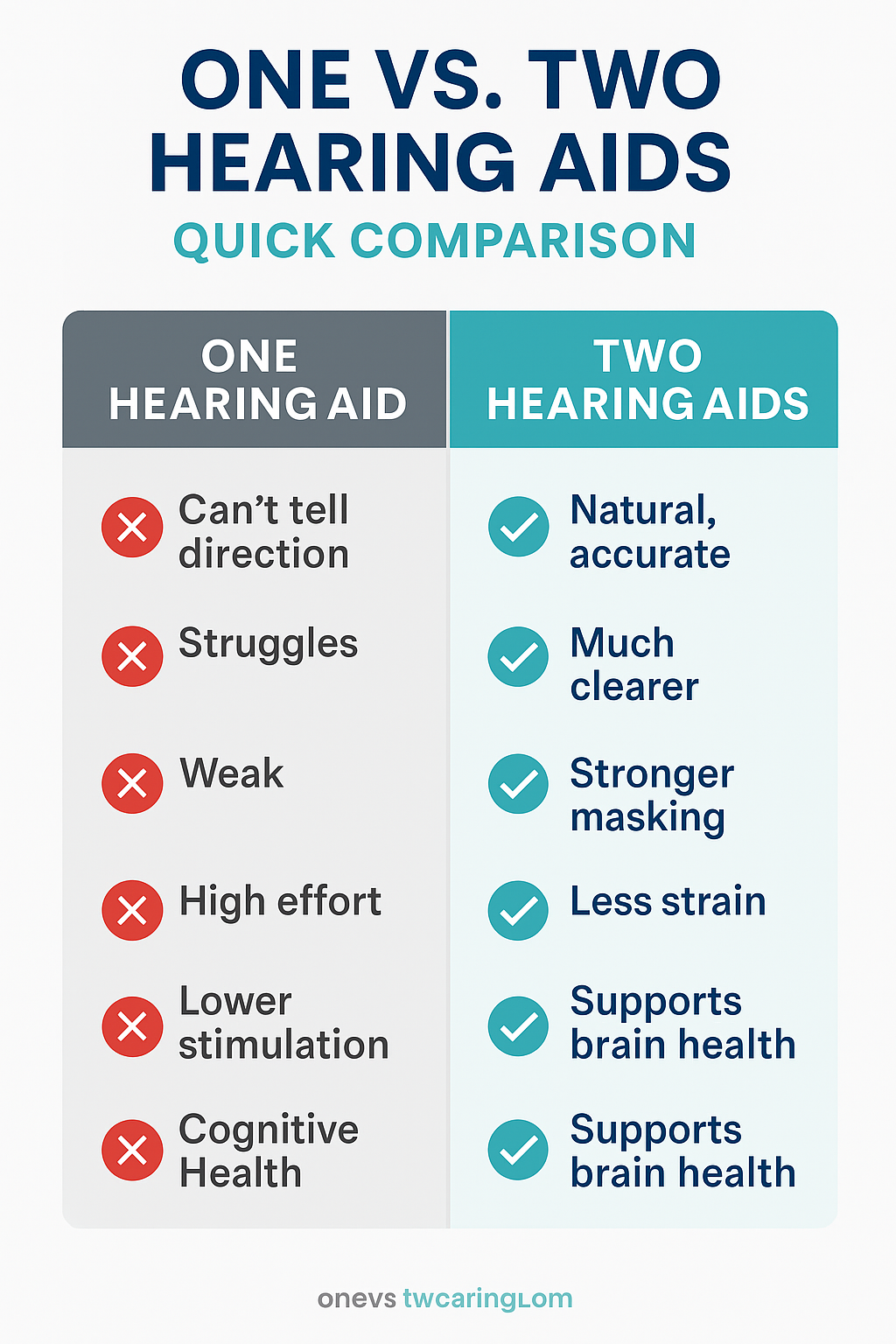1. Improved Sound Localization and Safety
Sound localization — the ability to detect where sounds are coming from — is vital for daily safety. When both ears are supported by hearing aids, your brain processes sound direction more accurately.
Practical benefits include:
- Hearing the direction of oncoming traffic when crossing a busy street.
- Responding when someone calls your name from behind.
- Feeling more confident while driving.
With only one aid, patients often describe the world as “flat” or “one-dimensional.” Two devices restore a more natural, spatial hearing experience.
2. Better Speech Understanding in Noise
Restaurants, family gatherings, and church events are tough listening environments for anyone with hearing loss. Two hearing aids work together to help your brain separate speech from competing background noise.
Benefits include:
- Clearer word recognition in noisy environments.
- Less listening fatigue since you aren’t straining as much.
- Compatibility with advanced features like directional microphones and remote microphones for even greater clarity.
Learn more about how hearing aids improve communication.
3. Relief from Tinnitus (Ringing in the Ears)
Tinnitus affects millions of people, often making concentration, relaxation, and sleep difficult. Two hearing aids can reduce tinnitus perception by:
- Amplifying background sounds, which mask ringing or buzzing.
- Providing balanced stimulation to both ears, reducing stress.
While not a cure, many patients find tinnitus becomes less noticeable with two devices compared to one.
4. Reduced Listening Effort & Prevention of Auditory Deprivation
Wearing only one hearing aid forces the brain to work harder, creating listening fatigue over time. Even more concerning is auditory deprivation, which occurs when the unaided ear loses its ability to process sound due to lack of stimulation.
Two aids help keep both ears active, supporting long-term auditory health and maintaining your brain’s ability to recognize speech.
5. Cognitive Health and Long-Term Stimulation
Recent research links untreated hearing loss to cognitive decline and dementia risk. Keeping both ears stimulated with properly fitted hearing aids may help protect brain health by ensuring consistent auditory input.
Think of it this way: just as both eyes are needed for depth perception, both ears are needed for strong brain processing of sound.
See more about the benefits of hearing aids.
When One Hearing Aid May Be Enough
There are situations where wearing two hearing aids isn’t the best option:
- Dead ear (single-sided deafness): No usable hearing in one ear.
- Poor word recognition in one ear: Amplification won’t improve clarity if the auditory nerve can’t process sound.
In these cases, an audiologist may recommend:
- CROS or BiCROS hearing aids to transfer sound from the poorer ear to the better ear. Learn more here.
- Cochlear implants if hearing loss is profound and traditional aids provide little benefit.
These cases are relatively rare but highlight why professional guidance is essential.
Cost Considerations: One vs. Two Hearing Aids
Hearing aids are expensive, and insurance coverage is limited. Many patients are tempted to “start with one” to save money. But here’s what I tell my patients:
- Two basic or mid-level devices are better than one premium device. Balance matters more than luxury features.
- OTC hearing aids may be an affordable way to achieve sound in both ears, especially for mild to moderate hearing loss. Compare OTC vs. professional models here.
Investing in two devices usually leads to better outcomes, greater satisfaction, and less risk of returning your aids out of frustration.
Read more about the cost of hearing aids.
One vs. Two Hearing Aids: At a Glance
| Feature/Benefit | One Hearing Aid | Two Hearing Aids |
|---|---|---|
| Sound Localization | Poor — hard to tell direction | Accurate, natural |
| Speech in Noise | Limited help | Significantly better |
| Tinnitus Relief | Minimal masking | Stronger masking effect |
| Listening Fatigue | Higher effort | Reduced effort |
| Auditory Deprivation Risk | Yes, in unaided ear | No, both ears stimulated |
| Cognitive Health Support | Weaker | Stronger |
| Overall Satisfaction | Moderate | High |
FAQs About Wearing One vs. Two Hearing Aids
Do I really need two hearing aids if my loss is mild?
Yes, usually. Even mild losses in both ears benefit from balanced stimulation, especially in noisy environments.
What if I can only afford one hearing aid?
If budget is the issue, consider starting with two mid-level or OTC devices rather than a single premium device. You’ll likely get better overall benefit.
Are two hearing aids always recommended?
Not always. If you have single-sided deafness or poor word recognition in one ear, a CROS/BiCROS or cochlear implant may be better.
Will two hearing aids last longer than one?
Yes, in a way. Since each device shares the workload, components like microphones and receivers may wear out more slowly compared to one aid doing all the work.
Final Thoughts
While there are rare cases where one hearing aid is appropriate, the vast majority of patients benefit from wearing two. The advantages of binaural hearing — from safety and speech clarity to reduced listening fatigue and tinnitus relief — far outweigh the initial cost difference.
Your hearing health is too important to compromise. Consult with an audiologist to determine the best solution for your hearing needs, lifestyle, and budget.
For more resources, see:

